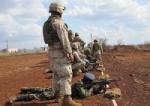Counternarcotics in Afghanistan
July 6, 2010, 10:00am-11:30am
Location:
U.S. Institute of Peace
2nd floor
1200 17th Street NW
Washington, D.C. 20036
The United States and its NATO allies in Afghanistan view counternarcotics initiatives as vital to counterinsurgency efforts by cutting off revenue to insurgents. A new Center for International Cooperation (CIC) report entitled "Drug Production and Trafficking, Counterdrug Policies, and Security and Governance in Afghanistan" challenges this assumption. Instead, the authors argue:
Current counter-narcotics policy in Afghanistan is financially benefiting - rather than hurting - insurgents;
Rural development efforts should be focused on assisting rural populations - aid should not be conditioned on desistance from poppy-growing; and
Counter-narcotics policy should be refocused to discriminate against illegal armed groups and corrupt officials in enforcement.
The report utilizes microeconomic analysis of the likely consequences of various counternarcotics strategies on both drug-market outcomes and the security and governance situation in Afghanistan. It examines the division of drug trafficking revenues among insurgents, "warlords", and corrupt government officials; the likely impact of drug enforcement policies on different points of the distribution chain; and the effect of these policies on drug consumption, dependency, and harm to drug users.
This event will feature the following speakers:
Jonathan Caulkins, Presenter
Co-author, "Drug Production and Trafficking, Counterdrug Policies, and Security and Governance in Afghanistan."
Mark Kleiman, Presenter
Co-author, "Drug Production and Trafficking, Counterdrug Policies, and Security and Governance in Afghanistan."
Jonathan Kulick, Presenter
Co-author, "Drug Production and Trafficking, Counterdrug Policies, and Security and Governance in Afghanistan."
Philip B. Heymann, Discussant
Ames Professor of Law at Harvard and former Deputy Attorney General
William Taylor, Moderator
Vice President of Post-Conflict Peace and Stability Operations, U.S. Institute of Peace
Inquiries
Please contact Ashley Pandya at 202-429-3849 or
apandya@usip.org with any general questions about this event.
Media
Journalists should contact Lauren Sucher at
lsucher@usip.org or Allison Sturma at
asturma@usip.org.













Bookmarks